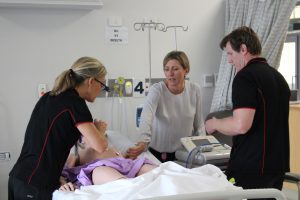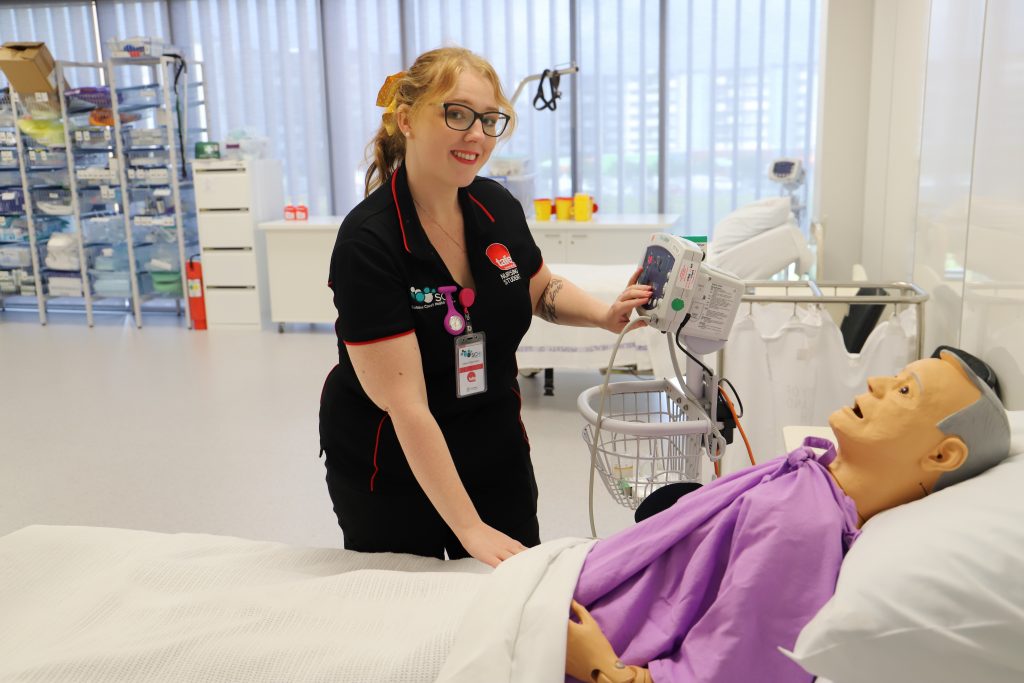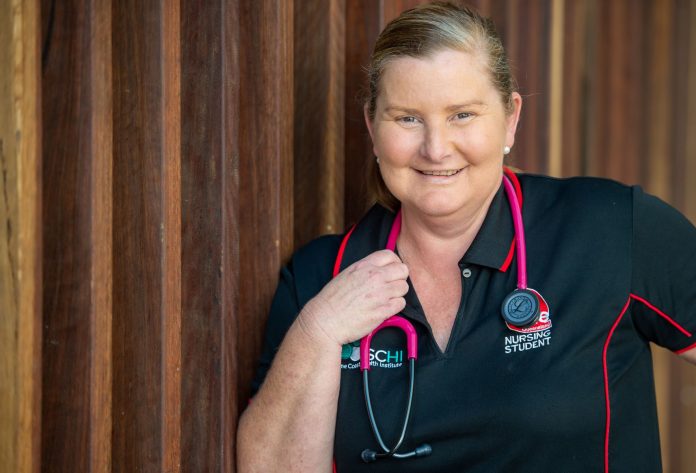With only seven per cent kidney function and spending half her day on dialysis, Rebecca Hodgson could easily have felt like life had come to a grinding halt.
But instead the 43-year-old Birtinya mum turned the ordeal of end-stage renal failure into an opportunity to embark on an exciting new career.
While hooked to the machines that kept her alive, the barista began a nursing diploma through TAFE and used the long hours on dialysis to study.
Then halfway through the 18-month diploma, and after three years on the organ transplant waiting list, Ms Hodgson received the unexpected call that she would be getting a new kidney and pancreas.
Like stories about Sunshine Coast people doing great things? Help us deliver more by registering for our free daily news feed. All it requires is your name and email. See SUBSCRIBE at the top of this article
Today, Ms Hodgson no longer requires dialysis and the double transplant has also cured the diabetes that was responsible for her failing kidneys.
She’s also months away from graduating as a qualified Enrolled Nurse and hopes to use her experience to pursue a career in the renal field and help others enduring a similar ordeal.

TAFE’s Diploma of Nursing has been delivered on the Coast for 15 years and since 2017 has been based at the Sunshine Coast Health Institute (SCHI) at Sunshine Coast University Hospital (SCUH).
Students have access to state-of-the-art equipment and training facilities and can undertake simulation scenarios that mimic the hospital environment.
“Add to this the fact the institute is located on the hospital grounds – where many students carried out their practical placements and will go on to work – and our students are able to transition into the health sector confident and job-ready,” said TAFE Queensland General Manager (East Coast region) Ana Rodger.
Since the course moved to SCHI, more than 270 students have graduated and launched their careers from the Coast.
Ms Hodgson said had it not been for the opportunity to study nursing through TAFE, she would probably still be tied to retail and hospitality.
She had been working as a barista at a bakery before her daily dialysis treatment planted the seed to pursue a mid-life career change.
“I wanted to be able to to live a normal life but when you have to go to the hospital every second day for dialysis it’s very hard to hold a job and have a normal life,” she said.
“But I worked out I would be able to do both and have the flexibility to do dialysis when it suited me if I did the training to learn how to do dialysis from home.”
Ms Hodgson underwent three months’ training at Nambour General Hospital, where she was taught everything she would need to know about hooking herself up to dialysis in the comfort of the spare room at home.

“I learnt how to cannulate myself, how to put myself on the machine and we went through every possible scenario that could happen at home such as the power going off,” said Ms Hodgson.
“Each time it was a five-hour process to cannulate, do the vital signs, get on the machine and four hours of dialysis.”
Managing her own dialysis gave Ms Hodgson a taste for nursing and she began researching her options and was impressed with the response and interaction she received from TAFE. The TAFE course required three days a week, which included one day undertaking hands-on learning at SCHI, while the other two days were devoted to theory.
She also completed four weeks’ work placement in the Orthopaedic Ward at Nambour General Hospital and another stint in aged care before her final placement commences with Sunshine Coast University Hospital in October.
Local journalists telling local stories. Help keep independent and fair Sunshine Coast news coming by subscribing to our free daily news feed. All it requires is your name and email. See SUBSCRIBE at the top of this article
While studying, Ms Hodgson’s life underwent another dramatic change when she received a double-organ transplant.
About halfway through the course in February 2020, while on her way to TAFE one day, she answered the phone and was told to drop what she was doing and fly to Sydney.
A kidney and pancreas had become available and she would need to be at Westmead Hospital by 3pm that day.
“It was overwhelming and exciting and there was also fear because it was such a long operation and I didn’t know if the organs would be okay; it was a big unknown,” she said.
“Now I don’t have to do dialysis and I don’t have diabetes. I really feel like a new person.”
Ms Hodgson said although it could feel like life was over for people with chronic illnesses, her story proved that “life keeps going”.
Wednesday 12 May is International Nurses Day.
TAFE Qld nursing diploma

TAFE graduates can register and seek work as Enrolled Nurses and have the skills to perform clinical assessments, contribute to the nursing care of people with complex needs, administer and monitor medications and IV therapy, and assist with general first aid and personal hygiene.
“Many graduates continue their studies to become Registered Nurses once they have entered the workforce, using their qualification to shave time off their university degree,” said Ms Rodger.
“Typically Enrolled Nurses are responsible for carrying out day-to-day patient care such as bathing and feeding patients and administering their treatment, while Registered Nurses lead the patient care, are involved in the development of treatment plans, liaise with patients’ families and supervise Enrolled Nurses.”
Other qualifications offered by TAFE Queensland at SCHI include the Certificate IV in Allied Health Assistance, Certificate III in Individual Support (Ageing, Home and Community), Certificate III in Health Services Assistance, Certificate III in Health Administration, and the Certificate II in Health Support Services.
QUEENSLAND DONOR FACTS
- 86 Queenslanders who died last year became organ donors, saving the lives of 253 Australians.
- Challenges associated with COVID-19 resulted in small declines in both the number of transplant recipients Qlders saved (-16%) and donors (-19%) in Queensland.
- Staff worked exhaustively to develop new ways of delivering compassionate end-of-life care, and to minimise the disruption to the organ transplant program.
- The proportion of Qld families who consented to organ donation last year remained steady at 62%.
- Queensland organ donor numbers have almost doubled in the decade since Australia’s national program began.
INFORMATION: www.donatelife.gov.au





